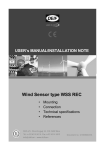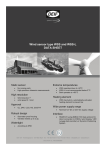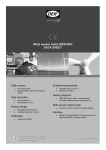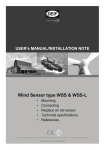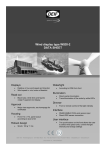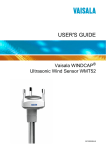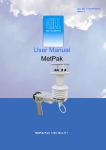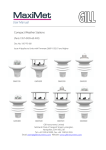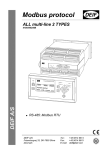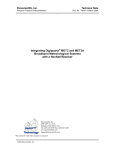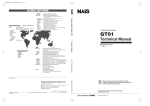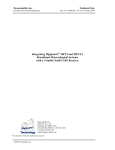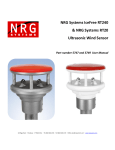Download Wind Sensor type WSS REC
Transcript
USER’s MANUAL/INSTALLATION NOTE Wind Sensor type WSS REC • • • • Mounting Connection Technical specifications References Document no.: 4189350037B WSS REC User’s Manual/Installation Note Table of contents 1. INTRODUCTION ......................................................................... 3 UNPACKING.................................................................................... 4 LEGAL INFORMATION AND RESPONSIBILITY ...................................... 4 2. MOUNTING THE WIND SENSOR ............................................. 5 PLACING OF THE WIND SENSOR ...................................................... 5 BIRD AVOIDANCE KIT (OPTIONAL) .................................................... 7 3. CABLE CONNECTIONS ............................................................. 9 THE WSS REC WIND SENSOR CABLE CONNECTIONS...................... 9 CONNECTOR KIT ASSEMBLY (OPTIONAL) ....................................... 10 4. DIMENSIONS ............................................................................ 11 5. TECHNICAL SPECIFICATION ................................................. 12 6. REFERENCES........................................................................... 15 DEIF A/S Page 2 of 15 WSS REC User’s Manual/Installation Note 1. Introduction This document provides guidelines for mounting and connecting the WSS REC static wind sensor. The ultrasonic wind measuring system used in the WSS REC is a fast responding and accurate system designed for measurement of wind speed and wind direction. The sensor is based on three ultrasonic transducers arranged in a triangle for measuring of wind speed and wind direction. By measuring the time it takes for a set of ultrasound bursts to travel from each transducer to the other two, the wind speed and direction can be calculated. The WSS REC has a built-in heater, which will automatically engage when risk of icing occurs during low temperatures. DEIF A/S Page 3 of 15 WSS REC User’s Manual/Installation Note Unpacking The WSS REC sensor is delivered in a cardboard box. Inside this box, the sensor is packed in a white foam box (called a protection cap), which is supposed to stay on, until the sensor is mounted in the mast. This will effectively protect the delicate sensor heads. Do not remove the white protection cap or the tape keeping it in place, before the sensor is mounted in the mast! The sensor is protected against ESD (static electricity), but it is recommended to avoid static discharge trough the connection wires during installation. Legal information and responsibility DEIF takes no responsibility for installation or operation of the wind measuring system. If there is any doubt about how to install or operate the WSS REC, the company responsible for the installation or the operation of the product must be contacted. The units are not to be opened by unauthorised personnel. If opened anyway, the warranty will be lost. DEIF A/S Page 4 of 15 WSS REC User’s Manual/Installation Note 2. Mounting the wind sensor Placing of the wind sensor Ideally, the wind sensor should be placed far from large objects that might influence the measuring results; however, in practice this is normally not possible on a wind turbine. The best result is achieved by placing the wind sensor at the top of a mast in the opposite end of the rotor. Placing the sensor just above the nacelle and just behind the rotor is disadvantageous. This may result in turbulence, velocities and wind directions that are out of proportion to the actual, undisturbed wind speed and wind direction. The wind sensor is intended for installation on a vertical socket or a tube using the stainless steel tap mounting base. See the drawing on the next page for dimensions of the tap. The tap must not be removed from the wind sensor, as this will damage the waterproof sealing and the warranty will become void. Do not expose the plastic part of the wind sensor to any torque when mounting the sensor. The tools used for fastening are only to be applied on the actual tap. DEIF A/S Page 5 of 15 WSS REC User’s Manual/Installation Note Mount the WSS REC Remove the protective cap To ensure that the measurement represents the precise wind direction relative to the turbine, the wind sensor must be aligned correctly. I.e. when mounting the wind sensor, the arrow on top (and bottom) of the white protection cap must be parallel with the centre axis of the nacelle from Protective cap rotor to the back. Note: An arrow pointing ahead is also found on the bottom part of the sensor itself. On land-based, non-rotating installations, the arrow must point towards North. Do not hit, squeeze or try to remove the three black rubber hoods! Do not expose the plastic part of the wind sensor to any torque when mounting the sensor; the tools used for fastening are only to be applied on the actual tap. DEIF A/S Page 6 of 15 WSS REC User’s Manual/Installation Note Bird avoidance kit (optional) The bird avoidance kit is designed to reduce the risk of birds landing on the WSS REC and thereby interfering with measurements or even damaging the sensitive ultrasonic transducer heads. The black rubber heads are known to attract some birds’ attention, due to the click-sound they produce. The bird avoidance kit is mounted as standard. Please note that the kit does not provide complete protection against birds, but especially large birds will not be able to land, whereas small birds may still be able to squeeze in. Small birds may interrupt the wind measurement, but will not be able to damage the sensor. The shape and location of the spikes is designed so the interference with wind measurements is negligible. When the kit is mounted on the WSS REC sensor, more snow may be able to accumulate on top of the sensor, and it may melt slower. Installation of the kit (retrofit only) 1. Position the metal ring with spikes around the stainless steel top plate of the WSS REC sensor. Position it so the spikes do not block the direct paths between the three black rubber heads, see picture. 2. Secure the metal ring using the M3x6 screw provided. It is recommended to secure the screw from loosening due to vibrations with a drop of Loctite® super glue or equivalent (not included in the kit) and tighten the screw all the way in. 3. Check that the kit is fitted tightly on the WSS REC. DEIF A/S Page 7 of 15 User’s Manual/Installation Note 49.5 82.4 149.8 25.0 198.0 WSS REC 114.0 127.0 ¾” pipe thread: Outer diameter: 1.04 inch (26.4 mm), 14 threads per inch. IMPORTANT! The stainless steel mounting base on the WSS REC sensor must be connected to earth (e.g. the steel hull). DEIF A/S Page 8 of 15 WSS REC User’s Manual/Installation Note 3. Cable connections The wind sensor is supplied with 10 metres fixed cable. From factory, the cable is connected to the sensor via a waterproof gland, and this must not be replaced by another cable. The cable can be extended by using the connection box kit or the IP67 connector kit (both optional). In order to protect the wind sensor and the personnel in the best possible way from lightning strokes, use a lightning rod installed with the tip at least one metre above the wind sensor. The lightning rod must be properly grounded in compliance with all applicable safety regulations. The wind sensor cable screen and the extension cable screen must be connected. For further protection of the cable from the wind sensor, it is recommended to use a metal conduit pipe cable. Suitable extension cable is available from DEIF at any length between one and 300 metres. Alternatively, an installation cable, e.g. UL2464 2 18AWG4C + AE, 4 x 0.75 mm screened, can be used. The max. length is 300 m, and maximum 70 nF capacity between the signal conductors. The WSS REC wind sensor cable connections Cable colour Black Red Orange Brown Shield Function Supply voltage RS485 comm. Cable shield Note + A B 9-31V DC supply for the WSS REC wind sensor Wind speed and direction data output Is connected to the stainless steel tap inside the WSS REC No supply voltage must be present during installation of the wind sensor, as this will damage the wind sensor. DEIF A/S Page 9 of 15 WSS REC User’s Manual/Installation Note Connector kit assembly (optional) The connectors must be soldered onto the cable according to the following instructions: WSS fixed cable Connector pin no. WSS extension cable Male connector Female connector Plug male 7 pin. 10 22 00 00 52 Plug female 7 pin. 10 22 00 00 53 Screw cap male, 10 29 92 00 02 Screw cap female, 10 29 92 00 03 Black (-) Red (+) Orange Brown Screen ● ● ● ● ● 1 2 3 4 5 Black (-) Red (+) Orange Brown Screen Signal comments ● ● ● ● ● 30V DC supply for WSS REC RS485 comm. from WSS REC Cable screen Measures are in mm DEIF A/S Page 10 of 15 WSS REC User’s Manual/Installation Note DEIF A/S ¾” pipe thread: Outer diameter: 1.04inch (26.4 mm), 14 threads per inch 114.0 127.0 49.5 82.4 149.8 198.0 4. Dimensions Page 11 of 15 WSS REC User’s Manual/Installation Note 5. Technical specification Sensors are designed according to the standards Standards below Power supply 12/24 V (9.0…31.2V DC) Power WSS REC with inactive heating element: consumption <0.1 W WSS REC with maximum heating: <15 W Interface RS485 bus: The bus should be terminated with 120 to 200 ohm for pure RS485 operation RS422 bus: For single listener connection on RS422, the data line must be terminated with a 200 to 250 ohm resistor to obtain the necessary output Data sentence $WIMWV – Wind speed and direction data NMEA 0183 $WIXDR – Transducer measurement ver. 3.0 response $WITXT – Error messaging For details, see doc. no. 4189350038, Appendix to User's Manual, WSS REC Wind speed Range: 0….60 m/s Resolution: 0.1 m/s Accuracy: 0…35 m/s: ±0.3 m/s or ±3%, whichever is greater >36 m/s: ±5% o Wind direction Range: 0…. 360 continuously o Resolution: 1 Accuracy: ±3% in relation to wind direction Update interval 1 sec. Start-up time <5 sec. from power on to valid data output DEIF A/S Page 12 of 15 WSS REC User’s Manual/Installation Note Sensors are designed according to the standards below 2 Connection 10 metres 4 x 0.75 mm screened cable type UL2464 18AWG/4C+DW+AL/MY+Jacket The 10 m cable is fixed on the sensor and is open-ended Mounting ¾” pipe thread: Outer diameter: 1.04 inch (26.4 mm), 14 threads per inch Protection IP66 Relative humidity Pressure Temperature Vibration test Safety EMC Housing Weight Dimensions, cardboard box DEIF A/S 0…100% 600…1100 hPa WSS REC operating range: -52…+60°C (class approved for: -25…+60°C) Storage (both): -60…+70°C 3…13.2 Hz: 2 mm (peak-peak) 13.2…100 Hz: 0.7 g 3…15 Hz: + 2.5 mm (peak) 15…50 Hz: 2.3 g Cat. III, poll. dg. 2, 550V AC rms, 50 Hz, 1 minute CE-marked for industrial environment Wind sensor housing: Polycarbonate +10% glass fibre Mounting tap: Corrosion-resistant stainless steel 0.8 kg 450 x 315 x 230 mm Standards IEC 529 and EN 60529 EN/IEC 60068-1/2 EN 60051 EN 60945, EN/IEC600 68-2-6 and DNV Class A GL curve 4 for masts EN 61010-1 EN 610001-1/2/3/4 UL94 V0 Page 13 of 15 WSS REC User’s Manual/Installation Note Sensors are designed according to the standards Standards below Accessories IP66 connection box kit: IP66 connection box with cable glands and screw terminals to extend the sensor cable with an extension cable IP67 connector kit: Watertight male and female connector for soldering to the sensor cable and the extension cable respectively Extension cable: 1 to 300m shielded cable, DEIF ID no.1020230016 Bird avoidance kit (standard, retrofit only): Spike kit to prevent birds from interrupting the wind measurements or, in worst case, from damaging the sensor DEIF A/S Page 14 of 15 WSS REC User’s Manual/Installation Note 6. References For more details, please refer to the following documentation: Appendix to User’s Manual, WSS REC, document no. 4189350038. Documentation is available at www.deifwindpower.com – Download centre. DEIF A/S reserves the right to change any of the above. DEIF A/S Page 15 of 15















